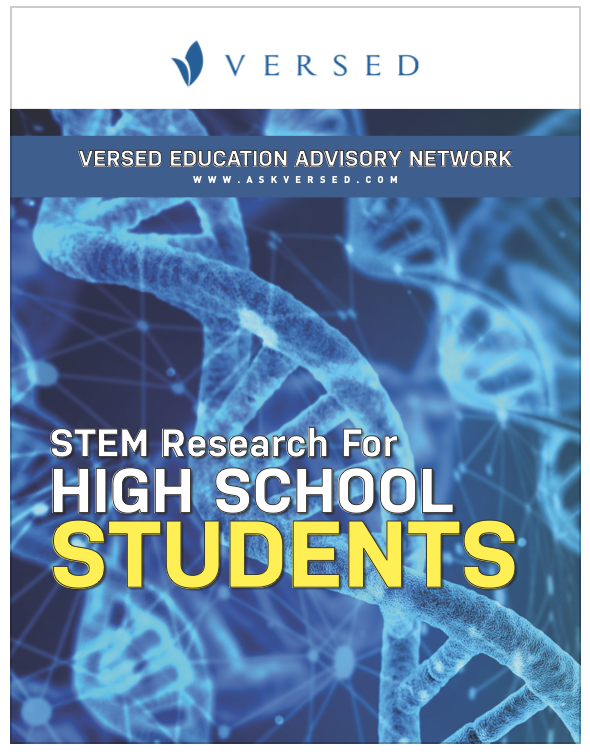
By: Kate Sonnenberg
As college admissions becomes more competitive, students frequently look for ways to “distinguish” themselves from their peers. One increasingly common choice: research. Research has become so popular in recent years that many companies have sprung up offering to match high school students with graduate students, postdoctoral fellows, and junior faculty who will supervise a research project.
But do colleges really value high school research when deciding whom to admit?
The answer, like so much in college admissions, is “it depends.”
At a recent conference I attended, the deans of admission at MIT and Williams College both stated that the mere fact that a high school student engages in research is not likely to impact an admissions decision. Admissions officers view research as they would any activity—it provides insight into how a student chooses to spend their time and allows admissions officers to understand a student’s interests.
Research can be a fantastic way for students to spend part of their summer (or even the school year if they have time) if there is a topic that genuinely interests them. Whether in STEM, the social sciences, or the humanities, students can delve deeply into a subject and develop expertise in a content area.
While conducting research, high school students can build important academic skills, including learning how to collect and organize data, analyze primary sources, and communicate effectively in writing; they can also develop valuable personal skills such as tenacity, persistence, and dedication. Students can also get an early sense of whether research is something they want to pursue in college, and perhaps even build off of high school research once in college.
But research that’s disconnected from students’ high school classes or extracurricular interests suggests it may be more about boosting an application than meaningful intellectual inquiry and it’s going to appear as such to college admissions officers. Colleges want students who are intellectually curious—research can demonstrate this—but they are not impressed with inauthentic resume building.
So, what should students genuinely excited about research do? Find a mentor! Mentors help students refine their research question, guide them through the fundamentals of research, supervise the writing process, and encourage them through the inevitable ups and downs of research. They may even be able to assist students in getting their research project presented at a conference or published in a journal. And sometimes a mentor is willing to write a helpful letter of recommendation to college.
Finding a mentor is not always easy, however. Students can ask their teachers, family members and friends for help in finding a mentor. They can also reach out to a researcher whose work is related to what the student wants to study; students pursuing this path need to be as specific and clear as possible about their research interest and make sure it aligns well with the mentor’s. Of course, students can also pursue research without mentorship. This may require even more tenacity and focus—research can be a slow and solitary endeavor—but a student who perseveres on their own has a lot to be proud of.
Students who are excited by a research topic, grow intellectually, find joy in the process, and persist even when the going gets tough are going to benefit from engaging in research regardless of whether it distinguishes them from their peers when it comes to applying to college. And, ironically, those are the very students who are most likely to impress an admissions officer—not because they did a research project, but because of who they authentically are.
About Kate Sonnenberg:
Kate Sonnenberg, of KS College Success, is a graduate of Princeton University and the Columbia University School of Law. Prior to launching KS College Success, Kate worked as an application reader in the Princeton University Admissions Office, where she read thousands of undergraduate applications. She also volunteered for nearly a decade with the Princeton University Alumni Schools Committee and chaired the committee that interviewed students in Essex (NJ) and Hudson (NJ) counties. In addition to practicing law in New York and Seattle, Kate taught legal writing at the University of the District of Columbia David A. Clarke School of Law in Washington, D.C. and English Composition at the National University of Singapore.
Kate is a member of the Independent Educational Consultants Association and the New Jersey Association for College Admission Counseling. She regularly attends conferences, seminars and webinars and has personally visited over seventy-five colleges, where she often meets with admissions representatives to get the inside story about college admissions trends. Go to https://www.kscollegesuccess.com/ to learn more about Kate.
STEM Research Guide for High School Students
This is the Bible of STEM research for High School students. In one comprehensive document, we provide students with detailed guidance on why, when, and how to conduct research. Includes over 1,000 listings of Research, Internship, Pre-College, Summer, School Year, Enrichment, and Volunteer Programs. Designed for High School and Middle School students looking ahead, this guide includes top programs in every category including Biology & Health Science, Computer Science, Engineering & Robotics, Physics & Astronomy, Math and more.
Subscribe to our Newsletter
Receive inside track information on college admissions process, high school and middle school planning, general pre-college guidance, and be the first to know about our events and announcements.
Comments
- Min's Blog
- Log in or register to post comments

